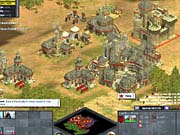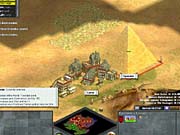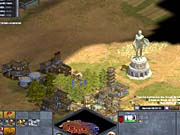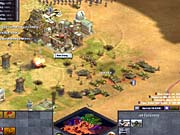Rise of Nations Updated Preview
We take an updated look at this unusual real-time strategy game from the co-designer of Civilization II.
Rise of Nations is the first game from Big Huge Games, the company founded by Brian Reynolds. For those not familiar with the name, Reynolds made major contributions to both Civilization II and to Alpha Centauri, and his involvement with the landmark Civilization series comes across in Rise of Nations. You may remember that another real-time strategy game, Age of Empires from Ensemble Studios, was originally hailed as a combination of real-time strategy and Civilization, but this description is more suited to Rise of Nations. The game imports many concepts from Civilization III and uses the familiar mechanics of real-time strategy to create a much more epic game. We recently spent some time with an updated version of the game, and it's shaping up to hold a good deal of appeal for fans of both the Civilization and Age of Empires series.

However, right off the bat, Rise of Nations looks like your average real-time strategy game. With the standard settings, you have a few workers and a few key buildings: the city center, a library, some farms, and a woodcutter. Resources are your key to expanding, but to begin with you only need to worry about three: food, wood, and wealth.
The library lets you conduct research. There are four minor areas of research: civics, military, commerce, and science. You also research age advancements at your library. Each area lets you expand your empire in different ways. Military research increases you population limit and gives you access to new units; civics research lets you build more cities; commerce research increases the amount of resources you can harvest; and science research gives you access to new technologies.
In Rise of Nations, you'll usually begin in the Ancient Age. There are eight ages in total, and many of them introduce new resources that you must seek out and harvest. Until you get to the Classical Age, all you can do is harvest food and wood and build some basic combat units and buildings, like markets. Markets let you produce caravans, which create trade routes between your cities and give you wealth. Once you reach the Classical Age, you can build mines to gather metal and build universities to "harvest" knowledge, which will become one of the most important commodities in the game. Each university can hold up to seven scholars, and the number of scholars determines the rate at which you attain knowledge.
By the time you reach the Classical Age, you will have undoubtedly begun to expand. As you expand, you'll notice how Rise of Nations is comparable to Civilization III. Like that game, Rise of Nations uses national borders to show the boundaries between different civilizations' territory. There is a certain amount of territory under your influence, and this determines where you can build new cities. Your borders can be expanded through research and certain buildings or by simply building up your empire with new cities. The number of cities you can build is limited by the level of your civics research, so you must be careful about expanding too much in a limited area.

As you explore the map, you'll find special resources. These are gathered by sending a merchant to set up shop nearby, and they bestow your nation with interesting benefits. For example, horses will make mounted units cheaper to produce, while wool will lets you produce scholars and citizens more quickly. There are dozens of special resources, and more appear with each age.
Once you have a few cities and some troops, you'll likely be intimidated by the number of options you have. Fortunately, Rise of Nations takes much of the micromanagement of real-time strategy games out of your hands, so that you can concentrate on the bigger picture. For instance, idle workers will find something to do on their own, and those picked to construct a building will return to their previous tasks once construction is complete. Likewise, exploration can be automated, so that you can uncover the map without having to guide your explorers by hand.
Battles That Will Go Down in History
There are dozens of options for customizing a skirmish game, but the standard options require you to occupy a certain percentage of the world or attain a certain number of wonder points. Research advances will give you the option to build wonders in your cities, and each wonder is worth a certain number of points. Obviously, more-advanced wonders that become available later on in the game are worth more. Wonders also add benefits to your nation. The pyramids increase the maximum amount of resources you can collect, the Eiffel Tower increases your oil output and expands your borders, and the Taj Mahal increases your wealth and the hit points of your building. Once you reach the target number of wonder points, you must keep your wonders intact for several minutes while your enemies try to destroy them.

Another way to achieve victory is to control lots of territory. Undoubtedly, you'll need to conquer some enemy cities along the way. Combat in Rise of Nations features some interesting twists. Your basic units are upgraded automatically as you research new military technologies, so your pikemen and archers will eventually become gun-toting modern warriors if they survive long enough. In addition to infantry, you have cavalry units, which eventually become armored vehicles, and siege weapons, which eventually become powerful howitzers. Once you reach the Industrial Age, you'll be able to build aircraft. You begin with zeppelins and biplanes and can eventually upgrade these to bombers and fighters. The Modern Age brings nuclear weapons and nuclear defenses.
When you enter into enemy territory, your units will suffer attrition. Attrition affects your unit strength and makes defending against a large invasion easier--especially for the Russians, whose territory causes double the attrition of other nations. But as you might expect, the Russians aren't invincible, and have other specific features that balance this special ability out, and if you want, you can turn off nation-specific benefits entirely. Once you've reached your enemy's city, your siege weapons wreak havoc on the town, and then your infantry can assume control of that city. But conquering towns isn't quite as simple as it might sound. Once you have control of a city, it goes through an assimilation period, during which your enemy can re-take the town rather easily. But once the city is fully assimilated, it becomes part of your territory, and you gain the benefits of it and any city-specific buildings left intact by your invasion.

Attrition and assimilation should help to make combat more interesting than in your typical wipe-out-everything real-time strategy game. Even with a large force, taking a single city can be a challenge. But it doesn't have to be a challenge. Rise of Nations' difficulty levels are wide-ranging and helpful. On the "easiest" setting almost anyone can win, and quite quickly. It serves as a perfect tutorial for learning the ins and outs without too much of a challenge. On the "moderate" setting, things get more challenging, and the computer opponents put up a good fight, attacking early and often (though you can choose a "no rush" rule, which makes combat off-limits until the Gunpowder Age).
There are still quite a few features that we haven't had a chance to play with yet. We haven't seen the single-player campaigns, or the multiplayer, and we've been able to play with only a handful of nations. But even so, the game shows a good deal of promise. It will be instantly familiar to those who have played Civilization or Age of Empires, but with its larger scope and unique focus on expansion and research, Rise of Nations should have enough to set it apart from the rest.
Got a news tip or want to contact us directly? Email news@gamespot.com
Join the conversation